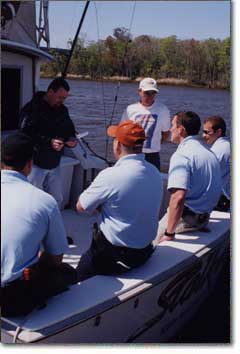 The
OLE seeks dedicated professionals interested in a career
protecting our nation's living marine resources.
The
OLE seeks dedicated professionals interested in a career
protecting our nation's living marine resources.
What are the jobs?
Criminal Investigators (GS-1811) grade 5/12, Enforcement
Officers (GS-1812) 5/9, computer specialists, technicians,
and administrative staff.
What do these people do?
Enforcement Officers provide the uniformed patrol/inspection
arm of the OLE. They monitor vessel offloads, inspect plants
and records, and patrol to deter and detect violations.
Criminal Investigators perform the investigative function.
They investigate complex civil and criminal violations;
perform undercover work, and build cases that document
complex under-logging, fraud, and misreporting schemes.
Community Oriented Policing and Problem Solving and partnerships
are important tools used to promote compliance.
Opportunities Include
For additional information visit the OPM
web site at www.opm.gov
For vacancy information check: www.usajobs.opm.gov or
an interactive voice response telephone system at (912) 757-3000
or TDD (912) 744-2299.
Training
As with every federal law enforcement position, candidates
must meet strict qualification and physical standards as
defined in the Office of Personnel Management Qualification
Standards for General Schedule Positions.
Once selected to become an OLE special agent or enforcement
officer, a candidate will receive highly engaging and intense
training.
OLE Special Agents attend the Criminal Investigation Course,
while OLE Enforcement Officers attend the Natural Resource
Police Training program which replaced the Land Management
Training Program.
The special agents' course is designed to provide traditional
investigative law enforcement skills with further expertise
in criminal human behavior, modern technology, law, and other
interdisciplinary approaches to effective law enforcement.
Courses are taught in fraud investigation, undercover operations,
electronic surveillance, and advanced interrogation.
The enforcement officers' course is designed for natural
resource management agencies with emphasis on the patrol
functions of enforcement in a natural resource environment.
The enforcement officers receive training in patrol techniques
including; interviewing, suspect control, arrest techniques,
driving skills, law, firearms, narcotics and communications.
These courses are taught at the Federal Law Enforcement
Training Center (FLETC) in Gynco, GA. FLETC, designed to
train all federal law enforcement agents and officers, also
trains United States Customs Service and the Bureau of Alcohol,
Tobacco and Firearms, the U.S. Marshal's Service, the
Secret Service and numerous other federal law enforcement
personnel.
Both agents and officers attend various specialized courses
in emergency medical response, witness and suspect interviewing,
marine vessel operation, firearms qualification and survival
training. Optional courses included Spanish, computer forensics,
and photography. All employees assigned law enforcement duties
attend annual refresher training.
Training continues for special agents and enforcement officer
throughout their careers, as regulations change and new technologies
and tactics are implemented.
With the vast array of federal statutes and regulations,
and the ever changing complexity of fishery and environmental
issues, these special agents and enforcement officers need
to be cognizant of changing laws which they are required
to enforce. These also need to be able to explain these laws,
and regulations and any recent modifications or changes to
those working in industry, environmental organizations or
the general public.
The OLE is also called upon by Federal, state, local and
tribal agencies, non-governmental organizations, educational
groups, and the general public to conduct OLE specific-training
on a variety of issues. These training sessions are conduct
all over the country and have subject matter ranging from
specific fisheries, to interaction with marine mammals, to
law enforcement specific issues.